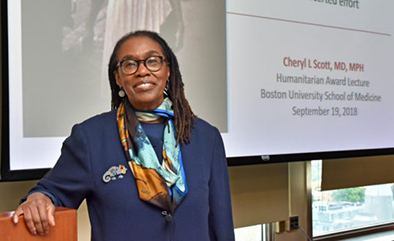‘A Sustained Commitment to Health Equity Is Essential’.

After nearly a 40-year career in preventive medicine, health systems strengthening, and domestic and international disaster work and relief, Cheryl Scott (MED’82) brings a wealth of clinical and public health experience to the School of Public Health as a member of the Dean’s Advisory Board.
The 24-member board helps Dean Sandro Galea and senior SPH leadership evaluate strategy and best practices, examine financial matters, and bolster philanthropic support of the school. “I’m very excited about the direction and energy that’s present at the School of Public Health,” says Scott. She says she appreciates the “palpable vitality and innovation at SPH.”
No stranger to the Boston University Medical Campus, Scott graduated from the School of Medicine in 1982 and completed a residency in internal medicine. She earned a Master of Public Health in International Health at Johns Hopkins University School of Hygiene and Public Health (now Johns Hopkins Bloomberg School of Public Health) in 1986. Currently a medical consultant for women’s health, family planning, and HIV/STD at the South Carolina Department of Health and Environmental Control, Scott brings significant medical experience to the board, including 20 years as a medical officer in the US Public Health Service Commissioned Corps (PHS) assigned to the Centers for Disease Control and Prevention (CDC).
Scott is passionate about health equity and system issues that affect marginalized populations. She received her medical degree amidst the HIV/AIDS epidemic and devoted her career to disease control and treatment, developing sustainable solutions to the social and economic barriers that impact health all over the world.
“Serious societal problems are impacting the status of public health in this country,” says Scott, citing nationwide conditions such as maternal mortality, increasing suicide rates, and the persistent racial wealth gap. She believes that “establishing a sustained commitment to health equity is essential to rid our country of the institutionalized shackles that are still holding it back.”
Scott was exposed to these inequities early in her clinical and public health work, which centered on infant mortality and pregnancy complications. After completing projects in Cote d’Ivoire, India, Kenya, and the Caribbean, where she studied uterine rupture, pancreatic cancer and delayed puberty among malnourished schoolgirls in these settings, she decided to pursue her MPH to gain skills in applied epidemiology. Scott joined the CDC and PHS in 1993 and served as an epidemic intelligence service officer in the Maternal and Child Health Division of the California Department of Health Services. She has had multiple assignments and held several senior public health roles in the US, Caribbean, Latin America and several African countries.
From 2000-2005, Scott was seconded to the US Department of State and served as the inaugural CDC Director in Tanzania, where she established a CDC office and a $34 million HIV/AIDS program for prevention, care, and treatment, which laid a cornerstone for the rapid scale-up of national services on Tanzania’s mainland and islands of Zanzibar. Scott’s collaboration with the Tanzanian government and its multiple partners played a critical role in the implementation of the country’s first no-cost national antiretroviral therapy program.
Scott returned to the US to work for the next five years with the California Department of Public Health Multidrug-Resistant Tuberculosis Service. She retired from the PHS at the rank of captain in 2010, and served for five more years on the Pacific and Southwest Regional Health Equity Council, which established a system to leverage resources into equitable public health policies and practice within the region.
Now, Scott applies her public health skills to communities in South Carolina that are tackling some of the same disparate health outcomes she has encountered throughout her career. The state’s syphilis and HIV/AIDS rates are among the highest in the nation.
As an African American woman, Scott says she experienced several challenges throughout her career, working in an industry staffed and led primarily by white men.
“There were very few women of color at the CDC when I joined,” says Scott, adding that it was important for her to represent and be represented as an African American woman. She praises the vision and tenacity of her CDC colleagues, whom she joined in pushing for the agency to “recognize racism as a social determinant of public health” — especially at a time when epidemiologic data was invariably highlighting its impact on health outcomes. Working directly with communities on strategies toward health equity, Scott learned the importance of community context and the power of local community input and participation.
Looking back on her work, Scott says her career of service has been “a tremendous gift and exchange.
“My career in public health is filled with growth,” she says. “Now my energy is focused on addressing gaps.”
Comments & Discussion
Boston University moderates comments to facilitate an informed, substantive, civil conversation. Abusive, profane, self-promotional, misleading, incoherent or off-topic comments will be rejected. Moderators are staffed during regular business hours (EST) and can only accept comments written in English. Statistics or facts must include a citation or a link to the citation.